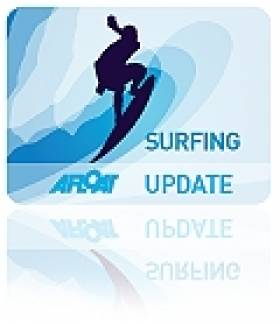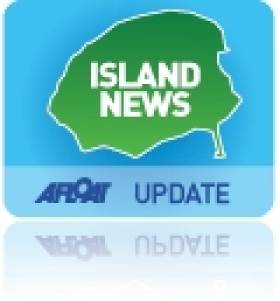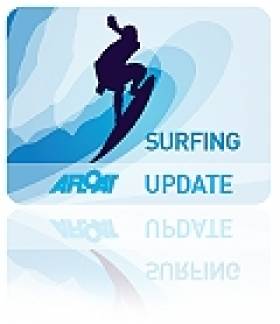Displaying items by tag: Red Bull
The Red Bull Cliff Diving World Series is set to return to Ireland on 12 September, with Downpatrick Head in Co Mayo hosting the fourth stop on this year’s international circuit.
It’s one of the four new locations for the elite cliff diving competition, along with spots in France, Norway and the Caucasus.
It also marks the fifth Irish edition of the event — following three visits to Inis Mór in the Aran Islands and 2019’s contest in Dun Laoghaire, which attracted an estimated 145,000 spectators.
Elite divers representing 18 nationalities will take part in the 2021 series, which kicks off at Cap Dramont, south-west of Cannes on France’s Mediterranean coast, on 12 June.
The athletes then head to Oslo in Norway (14 August) and Mostar in Bosnia and Herzegovina before their Irish stop, continuing on to Polignano a Mare in southern Italy (26 September) and Baku in Azerbaijan (16 October).
Red Bull Storm Chasers Take off in Kerry
#redbull – The organisers of Red Bull Storm Chasers have scrambled all their crews and teams who had 48hrs to travel from across the globe to Ireland for the first "Mission" on the 3 mission challenge writes Brian Carlin.
Today saw the majority of the country hit with storm force winds. It's results included debris filled roads, heavy traffic, structural damage to buildings and generally unwanted among the most of the country.
Well, not quite the same could be said if you were standing on the back beach in Castlegregory, Co.Kerry locally known as "Dumps" this morning.
It's simple, Red Bull Storm Chase set a 4 month challenge where they require 3 "missions" to be completed. There is 7 possible locations, United States, Iceland, Ireland, Spain, France, Tasmania and Japan.
The conditions seemed just right for the organisers who pulled the trigger Saturday, a logistically nightmare to get the gear, teams, TV crews, helicopters to Ireland.
The first session of the day kicked off in Dumps, Co.Kerry at 7am. A dark morning that quickly brightened by mid-morning. There was a small gathering, massively understated as I read the event is "Windsurfing's Most Challenging Contest". It wasn't long before I understood the attitude, these guys were interested in the sport, they didn't care about hitting news headlines or making the papers, they spoke and were friendly but it was obvious the feeling was focused on the event and nothing else. Serious dedication. In fact I spoke with a competitor who told me his opposition flew in from Maui at 1.30am Monday to Dublin airport. He jumped straight into a car drove through the night. Had his breakfast and showered, then proceeded to suit up for the days challenge.
The crowds did begin to grow and by 12pm about 100 spectators looked on. The winds increased with gusts recorded over 50 knots. As the wind slightly shifted from south west to west south west the organisers decided to move the camp and head to "Hell's Gate". You couldn't build what seemed to be the God's natural Amphitheatre for this event. A little rocky cove that backed onto the North Atlantic, slightly sheltered which made launch and recovery much easier. The cliffs were lined with a variety of young and old, even the local farmers stopped traffic in their tractors to what must have been a rather unusual sight, Red Bull cars and vans, a low flying helicopter and handful of windsurfers who seemed to spend as much time in the air as in the water.
Six sailors now advance to the next mission, where and when? only the weather can decide the time and date.
Russian Wows Aran Islands Crowds at Red Bull Cliff Diving Event
#CLIFF DIVING - Russian cliff diver Artem Silchenko wowed the crowds on Inis Mor at the weekend, scoring big with a "breathtaking" new dive to take his second victory in a row in the Red Bull Cliff Diving World Series.
As the Irish Independent reports, 700 lucky spectators who won tickets to the limited-capacity event in the Aran Islands saw the 28-year-old steal the thunder from veteran diver Orlando Duque on a weekend that witnessed some spectacular 28-metre dives at Poll na Peist.
"My armstand with blind entry was brilliant and I beat by Orlando by just four points," Silchenko told Red Bull after his victory, which came just two weeks after he topped Duque to claim his first win of the series in the Azores.
"When I came to the platform after Orlando dived I saw nine and nine-and-a-halfs from the judges but I knew what I had to do for my final dive [a back triple triple].
"You know it’s a good dive only when you’re underwater. You’re travelling so fast it’s impossible to take it all in. Only after the entry can you say 'yes, it’s a great dive.'"
Silchenko had to pull out all the stops with Duque putting together his best set of dives all year. And the Colombian, whose programme included a back triple triple and his trademark reverse twister, says it bodes well for the rest of the season.
"This was probably the best competition I’ve done this year," said Duque. "It’s a challenge the way Artem is performing but I’m also doing better.
"This was my highest score of the season. If I can keep up this level then it’s going to be difficult for the others."
Nine-time world champion Duque retains the lead of the overall ranking going into the second half of the 2012 series, which next heads to Boston at the end of August.
Rossnowlagh Surfing to Feature in New RTE Show
Aidan Power and newcomer Daniella Moyles guide viewers around the pulsating world of heroes, music, fashion and high energy sports meeting some of the worlds brightest stars and biggest risk takers along the way.
Aidan and Daniella delve deep into the world of culture and cover everything from rising music performers and fashion designers to getting down and dirty with Ireland's graffiti artists.
Bulletin TV will bring you through the USA, Switzerland, Austria and Italy as well as travelling the length and breadth of Ireland to experience firsthand events such as Rossnowlagh Irish Intercounties Surfing Championships and The Red Bull X Fighters. Along the way they meet Irish & international athletes and find out what dBUerives them beyond the amazing to achieve the incredible.
In programme 1, Aidan catches up with Ireland's top female surfer, Easkey Britton as she leads an all-girl team in the Rossnowalgh Intercounties Surfing Championships in Donegal; Daniella finds out from Karina Hollekim if BASE Jumpers are really as crazy as they seem; David Coultard burns rubber in Belfast City Centre; Keith Walsh tells us of the pain of skateboarding; with the help of Isaac Newton, Travis Pastrana jumps his car 82 meters in the air and Akte Blani demonstrates that if you don't like your seat on a plane you should move....to another plane.
In programme 2, Daniella joins one hundred motorcross and enduro riders as they do battle over the original steeple chase route in Co. Cork; Aidan talks to Felix Baumgartner about his plan to be the first person to break the sound barrier without a vehicle; Mountain Biker Aaron Chase tells us what his spinal chord and a doughnut have in common; and Daniella catches up with award winning Irish fashion designer Amanda Grogan.
So, sit back, belt up and enjoy the world of extreme sports and culture with Bulletin TV. It promises to be an unforgettable ride.
Bulletin TV is a fully funded television series produced by COCO Television for Red Bull Media House GmbH.
































































